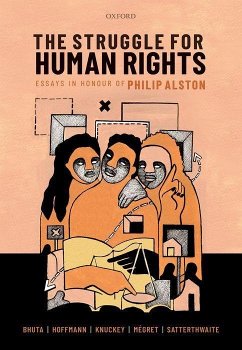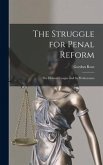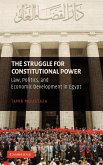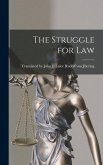The Struggle for Human Rights
Essays in Honour of Philip Alston
Herausgeber: Bhuta, Nehal; Satterthwaite, Margaret; Mégret, Frédéric; Knuckey, Sarah; Hoffmann, Florian
The Struggle for Human Rights
Essays in Honour of Philip Alston
Herausgeber: Bhuta, Nehal; Satterthwaite, Margaret; Mégret, Frédéric; Knuckey, Sarah; Hoffmann, Florian
- Gebundenes Buch
- Merkliste
- Auf die Merkliste
- Bewerten Bewerten
- Teilen
- Produkt teilen
- Produkterinnerung
- Produkterinnerung
The Struggle for Human Rights evaluates the themes of law, politics, and practice which define international human rights practice and scholarship. The essays examine foundational debates, critiquing the reform of human rights institutions and reflecting on the place of human rights in society.
Andere Kunden interessierten sich auch für
![The United States, International Law and the Struggle Against Terrorism The United States, International Law and the Struggle Against Terrorism]() Thomas McDonnellThe United States, International Law and the Struggle Against Terrorism197,99 €
Thomas McDonnellThe United States, International Law and the Struggle Against Terrorism197,99 €![The Struggle for Law [1915] The Struggle for Law [1915]]() Rudolf Von JheringThe Struggle for Law [1915]36,99 €
Rudolf Von JheringThe Struggle for Law [1915]36,99 €![The Struggle for Penal Reform The Struggle for Penal Reform]() Gordon RoseThe Struggle for Penal Reform38,99 €
Gordon RoseThe Struggle for Penal Reform38,99 €![The Struggle in Online Copyright Enforcement The Struggle in Online Copyright Enforcement]() Sandra VI SchmitzThe Struggle in Online Copyright Enforcement387,99 €
Sandra VI SchmitzThe Struggle in Online Copyright Enforcement387,99 €![The Struggle for Constitutional Power The Struggle for Constitutional Power]() Tamir MoustafaThe Struggle for Constitutional Power114,99 €
Tamir MoustafaThe Struggle for Constitutional Power114,99 €![Boycotts and the Labor Struggle Boycotts and the Labor Struggle]() Harry W LaidlerBoycotts and the Labor Struggle43,99 €
Harry W LaidlerBoycotts and the Labor Struggle43,99 €![The Struggle for Law The Struggle for Law]() John J. La von JheringThe Struggle for Law34,99 €
John J. La von JheringThe Struggle for Law34,99 €-
-
-
The Struggle for Human Rights evaluates the themes of law, politics, and practice which define international human rights practice and scholarship. The essays examine foundational debates, critiquing the reform of human rights institutions and reflecting on the place of human rights in society.
Hinweis: Dieser Artikel kann nur an eine deutsche Lieferadresse ausgeliefert werden.
Hinweis: Dieser Artikel kann nur an eine deutsche Lieferadresse ausgeliefert werden.
Produktdetails
- Produktdetails
- Verlag: Hurst & Co.
- Seitenzahl: 448
- Erscheinungstermin: 30. Dezember 2021
- Englisch
- Abmessung: 250mm x 181mm x 28mm
- Gewicht: 1057g
- ISBN-13: 9780198868064
- ISBN-10: 0198868065
- Artikelnr.: 62045363
- Herstellerkennzeichnung
- Libri GmbH
- Europaallee 1
- 36244 Bad Hersfeld
- gpsr@libri.de
- Verlag: Hurst & Co.
- Seitenzahl: 448
- Erscheinungstermin: 30. Dezember 2021
- Englisch
- Abmessung: 250mm x 181mm x 28mm
- Gewicht: 1057g
- ISBN-13: 9780198868064
- ISBN-10: 0198868065
- Artikelnr.: 62045363
- Herstellerkennzeichnung
- Libri GmbH
- Europaallee 1
- 36244 Bad Hersfeld
- gpsr@libri.de
Nehal Bhuta holds the Chair of Public International Law at University of Edinburgh and is Co-Director of the Edinburgh Centre for International and Global Law. He previously held the Chair of Public International Law at the European University Institute in Florence, where was also Co-Director of the Institute's Academy of European Law. He is a member of the editorial boards of the European Journal of International Law, the Journal of International Criminal Justice, Constellations and a founding editor of the interdisciplinary journal Humanity. He is also a series editor of the Oxford University Press (OUP) series in The History and Theory of International Law. Florian Hoffmann is a Professor of Law at the Pontifícia Universidade Católica do Rio de Janeiro (PUC-Rio), Brazil, and an associate researcher in the Núcleo de Direitos Humanos (Human Rights Center) of the Law Department. Prior to this he was the Franz Haniel Chair of Public Policy (2010-2016) and the Director of the Willy Brandt School of Public Policy (2012-2015) at the University of Erfurt (Germany). Before this he taught at the London School of Economics and Political Science (LSE) (2008-2010) and the PUC-Rio (2003-2008). His research has focused on international law, comparative law, and human rights. He is, with Anne Orford, the co-editor of the Oxford Handbook on the Theory of International Law (2016). Sarah Knuckey is a human rights advocate and clinical professor of law, and directs the Human Rights Clinic and the Human Rights Institute at Columbia Law School. She works in partnership with social justice advocates to investigate abuse and advocate for justice and rights around the world. Her academic research focuses on human rights methods and critique, armed conflict, clinical pedagogy, and mental health. Frédéric Mégret is a Professor of Law and a William Dawson Scholar at McGill University. He held the Canada Research Chair on the Law of Human Rights and Legal Pluralism from 2006 to 2015. He was promoted to full professor in 2019 and named co-director of the Centre for Human Rights and Legal Pluralism in 2021. Prior to joining McGill University, Professor Mégret was an Assistant Professor at the Faculty of Law of the University of Toronto, a Boulton fellow at McGill University and a research associate at the European University Institute in Florence. Margaret Satterthwaite is Professor of Clinical Law, Faculty Director of the Robert and Helen Bernstein Institute for Human Rights, Co-Director of the Center for Human Rights and Global Justice, and the Director of the Global Justice at NYU School of Law. Her research interests include legal empowerment, vicarious trauma and wellbeing among human rights workers, and interdisciplinary methods in human rights. Before joining the academy, she clerked for Judge Betty Fletcher of the Ninth Circuit Court of Appeals and the judges of the International Court of Justice, and worked for a number of human rights organizations, including Amnesty International, Human Rights First, and the Commission Nationale de Verité et de Justice in Haiti. She has authored or co-authored more than a dozen human rights reports and dozens of scholarly articles and book chapters.
* Introduction * Part 1. Arguing About the History, Theory, and Politics of Human Rights * 1: Georges Abi-Saab: The Organic Intellectual * 2: Hilary Charlesworth: Ritual and Ritualism in the International Human Rights System * 3: Joseph H. H. Weiler: The Targeted Killing of Jesus Christ * 4: Martti Koskenniemi: Rocking the Human Rights Boat: Reflections by a Fellow Passenger * 5: Sally Engle Merry: The State of Human Rights Consciousness: Not Yet Endtimes * 6: Euan MacDonald: Human Rights, Legitimacy and Global Governance * 7: Henry Steiner: Democracy and Democracies * Part 2. Setting the Rights Agenda * 8: Benedict Kingsbury: Human Rights in a Use Case World * 9: Bruno Simma and Giorgia Sangiuolo: Advocating an Ad Hoc Forum for Business Human Rights Disputes * 10: Olivier de Schutter: A Duty to Negotiate in Good Faith as Part of the Duty to Cooperate to Establish 'An International Legal Order in which Human Rights can be Fully Realized': the New Frontier of the Right to Development * 11: Gerard Quinn: Re-considering Personhood: From
Civil Death
to
Civil Life
for Persons with Disabilities * 12: Alicia Yamin: On Principle and Persuasion: Examining Philip Alston's Contribution to Economic and Social Rights through the Lens of Health * 13: John Tobin: Teaching Human Rights: Four Key Capabilities * 14: Malcolm Langford: Alston and Artificial Intelligence * 15: Vitit Muntarbhorn: Towards ASEAN Human Rights Law * Part 3. Human Rights Mechanisms: Building, Reforming, and Critiquing Institutions * 16: Thomas Hammarberg: Implementation of Treaty Obligations: Political Measures Expected of State Parties * 17: Mac Darrow: Up the Stream without a Paddle - Human Rights Challenges in Mega-Infrastructure Finance and Investment * 18: Andrew Clapham: Dilemmas Facing Commissions of Inquiry * 19: Jose Alvarez: Quis Custodiet Ipsos Custodes? Philip Alston * 20: Hélène Trigoudja: The Persuasive Authority of Philip Alston's Work for Human Rights Regional Bodies - United Nations Reports, Statements and General Comments Do Matter * Part 4. Human Rights Struggles * 21: Nehal Bhuta and Rebecca Mignot-Mahdavi: Dangerous Proportions: Means and Ends in Non-Finite War * 22: César Rodríguez-Garavito: Disrupting Human Rights: Existential Challenges and a New Paradigm for the Field * 23: Obiora Okafor: Praxis and the International Human Rights Law Scholar * 24: Sarah Knuckey and Margaret Satterthwaite: Should Human Rights Practice Be Rights-Based? * 25: Florian Hoffmann: Quite Enough (Still): Human Rights in (Times of) Crisis * 26: Frédéric Mégret: Alston in Alabama: Towards a Theory of Praxis in International Human Rights
Civil Death
to
Civil Life
for Persons with Disabilities * 12: Alicia Yamin: On Principle and Persuasion: Examining Philip Alston's Contribution to Economic and Social Rights through the Lens of Health * 13: John Tobin: Teaching Human Rights: Four Key Capabilities * 14: Malcolm Langford: Alston and Artificial Intelligence * 15: Vitit Muntarbhorn: Towards ASEAN Human Rights Law * Part 3. Human Rights Mechanisms: Building, Reforming, and Critiquing Institutions * 16: Thomas Hammarberg: Implementation of Treaty Obligations: Political Measures Expected of State Parties * 17: Mac Darrow: Up the Stream without a Paddle - Human Rights Challenges in Mega-Infrastructure Finance and Investment * 18: Andrew Clapham: Dilemmas Facing Commissions of Inquiry * 19: Jose Alvarez: Quis Custodiet Ipsos Custodes? Philip Alston * 20: Hélène Trigoudja: The Persuasive Authority of Philip Alston's Work for Human Rights Regional Bodies - United Nations Reports, Statements and General Comments Do Matter * Part 4. Human Rights Struggles * 21: Nehal Bhuta and Rebecca Mignot-Mahdavi: Dangerous Proportions: Means and Ends in Non-Finite War * 22: César Rodríguez-Garavito: Disrupting Human Rights: Existential Challenges and a New Paradigm for the Field * 23: Obiora Okafor: Praxis and the International Human Rights Law Scholar * 24: Sarah Knuckey and Margaret Satterthwaite: Should Human Rights Practice Be Rights-Based? * 25: Florian Hoffmann: Quite Enough (Still): Human Rights in (Times of) Crisis * 26: Frédéric Mégret: Alston in Alabama: Towards a Theory of Praxis in International Human Rights
* Introduction * Part 1. Arguing About the History, Theory, and Politics of Human Rights * 1: Georges Abi-Saab: The Organic Intellectual * 2: Hilary Charlesworth: Ritual and Ritualism in the International Human Rights System * 3: Joseph H. H. Weiler: The Targeted Killing of Jesus Christ * 4: Martti Koskenniemi: Rocking the Human Rights Boat: Reflections by a Fellow Passenger * 5: Sally Engle Merry: The State of Human Rights Consciousness: Not Yet Endtimes * 6: Euan MacDonald: Human Rights, Legitimacy and Global Governance * 7: Henry Steiner: Democracy and Democracies * Part 2. Setting the Rights Agenda * 8: Benedict Kingsbury: Human Rights in a Use Case World * 9: Bruno Simma and Giorgia Sangiuolo: Advocating an Ad Hoc Forum for Business Human Rights Disputes * 10: Olivier de Schutter: A Duty to Negotiate in Good Faith as Part of the Duty to Cooperate to Establish 'An International Legal Order in which Human Rights can be Fully Realized': the New Frontier of the Right to Development * 11: Gerard Quinn: Re-considering Personhood: From
Civil Death
to
Civil Life
for Persons with Disabilities * 12: Alicia Yamin: On Principle and Persuasion: Examining Philip Alston's Contribution to Economic and Social Rights through the Lens of Health * 13: John Tobin: Teaching Human Rights: Four Key Capabilities * 14: Malcolm Langford: Alston and Artificial Intelligence * 15: Vitit Muntarbhorn: Towards ASEAN Human Rights Law * Part 3. Human Rights Mechanisms: Building, Reforming, and Critiquing Institutions * 16: Thomas Hammarberg: Implementation of Treaty Obligations: Political Measures Expected of State Parties * 17: Mac Darrow: Up the Stream without a Paddle - Human Rights Challenges in Mega-Infrastructure Finance and Investment * 18: Andrew Clapham: Dilemmas Facing Commissions of Inquiry * 19: Jose Alvarez: Quis Custodiet Ipsos Custodes? Philip Alston * 20: Hélène Trigoudja: The Persuasive Authority of Philip Alston's Work for Human Rights Regional Bodies - United Nations Reports, Statements and General Comments Do Matter * Part 4. Human Rights Struggles * 21: Nehal Bhuta and Rebecca Mignot-Mahdavi: Dangerous Proportions: Means and Ends in Non-Finite War * 22: César Rodríguez-Garavito: Disrupting Human Rights: Existential Challenges and a New Paradigm for the Field * 23: Obiora Okafor: Praxis and the International Human Rights Law Scholar * 24: Sarah Knuckey and Margaret Satterthwaite: Should Human Rights Practice Be Rights-Based? * 25: Florian Hoffmann: Quite Enough (Still): Human Rights in (Times of) Crisis * 26: Frédéric Mégret: Alston in Alabama: Towards a Theory of Praxis in International Human Rights
Civil Death
to
Civil Life
for Persons with Disabilities * 12: Alicia Yamin: On Principle and Persuasion: Examining Philip Alston's Contribution to Economic and Social Rights through the Lens of Health * 13: John Tobin: Teaching Human Rights: Four Key Capabilities * 14: Malcolm Langford: Alston and Artificial Intelligence * 15: Vitit Muntarbhorn: Towards ASEAN Human Rights Law * Part 3. Human Rights Mechanisms: Building, Reforming, and Critiquing Institutions * 16: Thomas Hammarberg: Implementation of Treaty Obligations: Political Measures Expected of State Parties * 17: Mac Darrow: Up the Stream without a Paddle - Human Rights Challenges in Mega-Infrastructure Finance and Investment * 18: Andrew Clapham: Dilemmas Facing Commissions of Inquiry * 19: Jose Alvarez: Quis Custodiet Ipsos Custodes? Philip Alston * 20: Hélène Trigoudja: The Persuasive Authority of Philip Alston's Work for Human Rights Regional Bodies - United Nations Reports, Statements and General Comments Do Matter * Part 4. Human Rights Struggles * 21: Nehal Bhuta and Rebecca Mignot-Mahdavi: Dangerous Proportions: Means and Ends in Non-Finite War * 22: César Rodríguez-Garavito: Disrupting Human Rights: Existential Challenges and a New Paradigm for the Field * 23: Obiora Okafor: Praxis and the International Human Rights Law Scholar * 24: Sarah Knuckey and Margaret Satterthwaite: Should Human Rights Practice Be Rights-Based? * 25: Florian Hoffmann: Quite Enough (Still): Human Rights in (Times of) Crisis * 26: Frédéric Mégret: Alston in Alabama: Towards a Theory of Praxis in International Human Rights



![The Struggle for Law [1915] The Struggle for Law [1915]](https://bilder.buecher.de/produkte/66/66196/66196062m.jpg)




